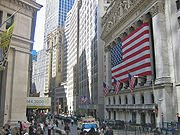 Derivatives are financial contracts, whose values are derived from value of an underlying asset. The underlying asset on which derivatives are based can be commodities, equities (stocks, residential mortgages, commercial real estate loans, bonds, interest rates, exchange rates, or indices (such as a stock market index, consumer price index (CPI) or even an index of weather conditions, or other derivatives). Credit derivatives are based on loans, bonds or other forms of credit.
Derivatives are financial contracts, whose values are derived from value of an underlying asset. The underlying asset on which derivatives are based can be commodities, equities (stocks, residential mortgages, commercial real estate loans, bonds, interest rates, exchange rates, or indices (such as a stock market index, consumer price index (CPI) or even an index of weather conditions, or other derivatives). Credit derivatives are based on loans, bonds or other forms of credit.The main types of derivatives are futures, forwards, options and swaps.
Derivatives are usually used to reduce risk that the value of the underlying asset will change unexpectedly.
Because the value of a derivative is contingent on the value of the underlying asset, the notional value of derivatives is recorded off the balance sheet of an institution, although the market value of derivatives is recorded on the balance sheet.
There are three major classes of derivatives:
Futures/Forwards are contracts to buy or sell an asset on or before a future date at a price specified today. A futures contract differs from a forward contract in that the futures contract is a standardized contract written by a clearing house that operates an exchange where the contract can be bought and sold, while a forward contract is a non-standardized contract written by the parties themselves.
Options are contracts that give the owner the right, but not the obligation, to buy or sell an asset on or before a future date at a price specified today. If the owner of the contract exercises this right, the counterparty has the obligation to carry out the transaction.
Swaps are contracts to exchange cash (flows) on or before a specified future date based on the underlying value of currencies/exchange rates, bonds/interest rates, commodities, stocks or other assets
No comments:
Post a Comment